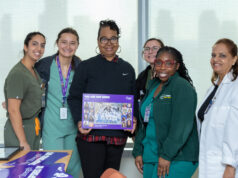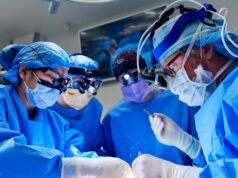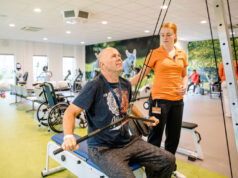 Surgeons at Northwestern Medicine (Chicago, USA) have, for the first time, performed a kidney transplant procedure where the patient was awake during the entire surgery and was discharged the next day. The patient, 28-year-old John Nicholas, felt no pain during the procedure and was home less than 24-hours after surgery. Instead of using general anaesthesia, which is standard, the surgeons delivered a spinal anaesthesia injection, an option which may open the door to increase access to transplantation for patients who are high-risk to undergo general anaesthesia, while also decreasing the length of a transplant patient’s hospital stay.
Surgeons at Northwestern Medicine (Chicago, USA) have, for the first time, performed a kidney transplant procedure where the patient was awake during the entire surgery and was discharged the next day. The patient, 28-year-old John Nicholas, felt no pain during the procedure and was home less than 24-hours after surgery. Instead of using general anaesthesia, which is standard, the surgeons delivered a spinal anaesthesia injection, an option which may open the door to increase access to transplantation for patients who are high-risk to undergo general anaesthesia, while also decreasing the length of a transplant patient’s hospital stay.
On 24 May 2024, Satish Nadig, Vinayak Rohan and Vicente Garcia Tomas (all Northwestern Memorial Hospital, Chicago, USA) performed the surgery, which took less than two hours. The patient received a type of anaesthesia similar to that used during a caesarean section. Nicholas had no risks or phobias to general anaesthesia, but was considered a great candidate for the procedure due to his age, limited risk factors, and his eagerness to participate in a medical first for Northwestern Medicine, the researchers report.
After a successful surgery on 24 May, Nicholas was discharged the next day and walked out of the hospital on 25 May. The normal hospitalisation for patients who undergo a kidney transplant at Northwestern Memorial Hospital is typically 2–3 days.
Commenting on the unique procedure, Nadig said: “This is the first case at Northwestern Medicine where a patient was awake during an entire kidney transplant procedure and went home the next day, basically making this an outpatient procedure. Our hope is that awake kidney transplantation can decrease some of the risks of general anaesthesia while also shortening a patient’s hospital stay. Inside the operating room, it was an incredible experience being able to show a patient what their new kidney looked like before placing it inside the body.”
Also sharing his thoughts, Tomas stated: “Providing anaesthesia for an awake kidney transplant was easier than many C-sections. For John’s case, we delivered a spinal anaesthesia injection in the operating room with a little bit of sedation for comfort. It was incredibly simple and uneventful, but allowed John to be awake for the procedure, improving the patient experience. Not only can awake kidney transplantation help patients who have risks or phobias to general anaesthesia, but it can help shorten their hospital stay so they can recover more comfortably at home.”
When asked about his experience during the procedure, Nicholas said: “It was a pretty cool experience to know what was happening in real time and be aware of the magnitude of what they were doing. At one point during surgery, I recall asking, ‘should I be expecting the spinal anaesthesia to kick in?’ They had already been doing a lot of work and I had been completely oblivious to that fact. Truly, no sensation whatsoever. I had been given some sedation for my own comfort, but I was still aware of what they were doing. Especially when they called out my name and told me about certain milestones they had reached.”
Prior to undergoing the procedure, Nicholas had to limit his salt intake, but has stated that he is now “looking forward to enjoying pizza and having more energy to ride his bicycle around Chicago”.
“When John agreed to be the first known patient at Northwestern Medicine to undergo an awake kidney transplant and be discharged home the next day, he knew the benefits outweighed the risks, and he’s now helping to move the field of transplantation forward,” said Rohan. “He is an extremely compliant patient who was in tune with his body and willing to push the envelope. He had the upmost faith in us, and we had the upmost faith in him. He really was otherwise quite healthy, and we felt we that he would be the best first candidate to really set Northwestern Medicine’s awake kidney transplant programme up for success.”
Going forward, Northwestern Medicine has stated that it will look to establish the Accelerated surgery without general anaesthesia in kidney transplantation (AWAKE) programme for a particular subsets of patients that want the operation but cannot have general anaesthesia, have a high-risk of complications due to general anaesthesia use, or in patients that are categorised to benefit from this technique.
Sharing his final thoughts, Nadig stated that this new programme will “open up a whole new door and [surgery without anaesthesia] is another tool in our tool belt for the field of transplantation,” said Nadig.












